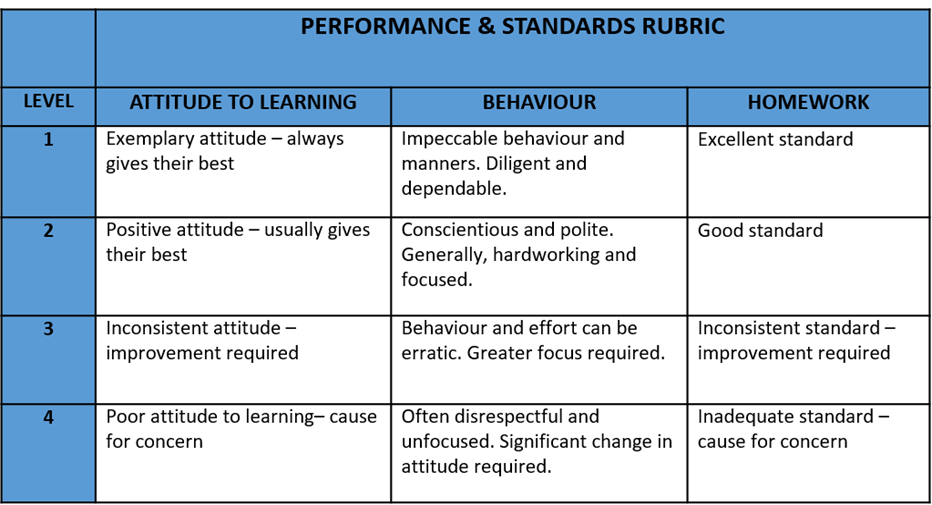Assessment
Strabane Academy aims to provide an equitable and excellent learning environment to enable all pupils to achieve their full potential. The work that we do in relation to Tracking, Monitoring and Interventions is central to achieving this vision as through this work we will:
- Maximise all learners’ attainment across the curriculum, raising attainment and maintaining high-performance over time.
- Provide personalised and bespoke support for all learners to achieve their absolute best throughout their time at Strabane Academy.
- Provide equity and excellence for all.
- Develop resilience and responsibility in our young people through appropriate support and encourage pupil voice through meaningful and focused learning conversations.
Target Setting
Target setting is a significant strategy for improving achievement, if the pupil is at the heart of the process. Our targets must be challenging, measurable, but also realistic and take into account the starting point for each individual pupil.
The targets set should:
- challenge all pupils to do better
- take into account each pupil’s starting point for learning
- encourage pupils to regularly discuss and review their progress with teachers
- involve parents and carers in their child’s learning
- lead to focused teaching and learning
- help us to make judgements about how well our school is doing when compared to all similar schools in local and national benchmark groups.
In Strabane Academy we use a range of information to support our target setting process:
- The Target grades are based on all available data, including CATs, Performance Analysis, Progress Testing in English (PTE), Progress Testing in Maths (PTM), SEN, Attendance, FSM and performance in Tracking/class tests.
Progress Testing
Progress Testing focuses on capturing learners’ progress at key stages throughout the school year. It involves teachers making judgements, based on robust assessment evidence, about learners’ progress and recording these to provide an overview to learners, parents’ and staff that can be analysed to identify strengths and weaknesses and the next steps for individuals.
- These assessments are carried out under examination conditions in the classroom or in Alexander Hall and are based on a range of topics studied in that particular area and differentiated appropriately for pupil’s capabilities.
- Tracking assessments at KS3 are reviewed for rigour and consistency by Heads of Department regarding the range and means scores and the use of Bloom’s taxonomy for effective questioning when setting exam papers.
- Heads of Departments ensure a consistent approach across the cohort in the same subject area (i.e. TRAB/LSK - Same test in subject area- N/Y Differentiated assessments but with same topics studied).
- At Key stage 4& 5, Tracking Assessments use the appropriate GCSE Examination Board past paper questioning and papers are set to build on prior knowledge and retrieval.
|
Typology of Questions |
Weighting % of Questions |
|
Remembering & Understanding (Knowledge/ Comprehension/Compare/ Contrast/Explain) |
40 |
|
Applying (Apply Knowledge/use information to interpret situation/ provide examples/ use of formula) |
35 |
|
Analysing (classify/ contrast between different pieces of information or data/organise |
15 |
|
Evaluating & Creating (Appraise/ judge or justify a decision or Predict out comes based on values/designing or devising or creating) |
10 |
There are currently 3 tracking events throughout the school year in KS3, 4 and 5 with an additional tracking test for year 12 and 14.
Tracking 1 follows class assessment in each subject using rigorous and robust testing, taking place at the mid-point of Term 1
Tracking 2 follows a series of formal examinations (PPEs) in December
Tracking 3 follows a series of formal examinations (PPEs) in February/March
Tracking 4 follows class assessment for yr12 and 14 in each subject using rigorous and robust testing, taking place in April before study leave.
The purpose of tracking is to monitor pupil progress across all subjects throughout the year. Following assessments, pupils have opportunities to set targets for development. Targets should be guided by the subject teacher and must be focused on specific areas for improvement. A tracking logbook in the pupil’s planner has been prepared for each pupil to collate their assessment outcomes and to set their own individual targets.
Pre-Public Examinations at Key Stage 4 & 5
Traditionally, these exams have been referred to as “mocks”. However, the word “mock” does not accurately reflect the importance of these exams as it suggests that they are “pretend” or “just for practice”. The reality is that these exams, as well as providing excellent preparation for public examinations, can also provide the pupils and teachers with really valuable information about the current levels of performance, strengths and those areas that still need to be developed in order for pupils to fulfil their potential in the summer.
Interventions & Pupil Support
Recording and reporting on progress is only part of the picture, as teachers, as departments and as a school we also use Tracking information to carry out interventions that are focused on raising the attainment and achievement of all children and young people. At Strabane Academy this will involve class teachers and departments developing Impactful interventions that are used across everyday learning and teaching. These Impactful interventions will be reinforced through the use of targeted interventions, using specialist provision, the use of mentors or other additional supports to ensure all barriers to learning are removed for all young people.
Impactful strategies that have proven success in Targeting Underachievement
- 1:1 support with class teacher for underachievers
- After school revision classes and controlled assessment clinics with extra support classes
- Revision morning/afternoon session before an exam.
- Regrouping students within the classroom based on achievement (new advice from EA). Underachievers placed together and high ceiling learners together. This will enable teacher instruction and resources to be tailored to each group more efficiently.
- Monitoring - Class teachers completing progress grids.
- Work booklets provided with questions, super summaries and mind mapping pages.
- Pupils who achieve a D grade or less at AS level are timetabled to join AS classes in their A2 year.
- The repeating of assessments if they were below their target grades.
- Essay question practice in class and essay mark schemes as guidance.
- Discuss progress with individuals as appropriate after each tracking stage.
- Year Head kept informed of performance through tracking.
- Easter Revision classes.
- Homework set and marked regularly to ensure all pupils are working at the level expected of them.
- Encourage parents to support revision at home.
Recording & Reporting
Parents/carers have the right to expect comprehensive, accessible and accurate information on the achievements of their child. Reporting is a significant part of the school's system of assessment, summarising the pupils ‘progress and achievement for the period covered by the report.
The school uses SIMS Assessment manager to produce reports on each pupil. Two types of report are used – a grid style Tracking report and a full written report.
A grid style report will include the following:
- Target and Tracking Assessment % following the grade boundaries set by the examination boards:
A*- 90% A- 80% B- 73% C*-67% C- 60% D-50%
- Grade Descriptors for – Attitude to Learning, Behaviour and Homework

Parents Guide to CCEA Examinations
parents guide to ccea examinations.pdf
Preparing for Exams
preparing for exams a 039 how to 039 guide for students 2.pdf



